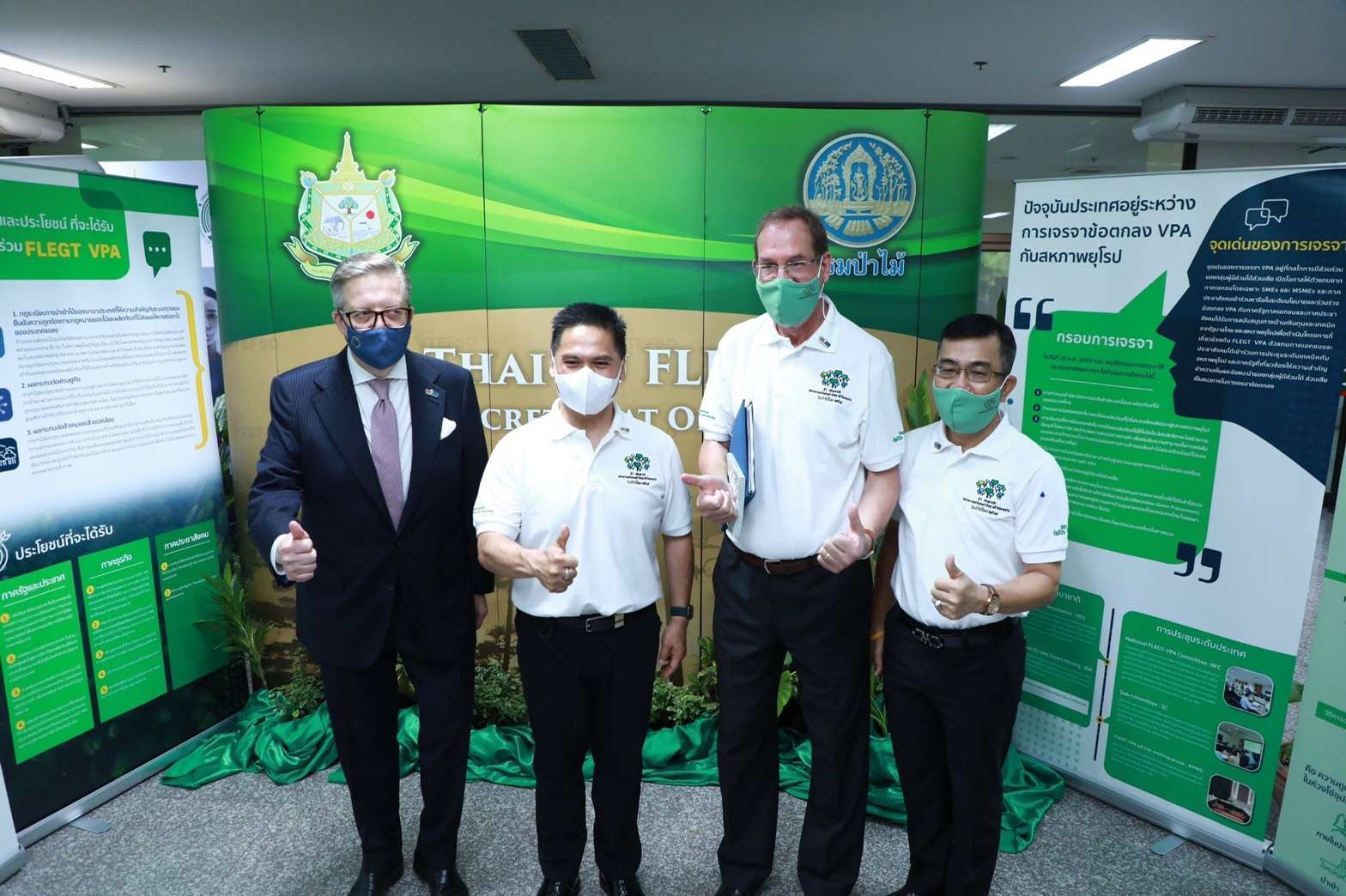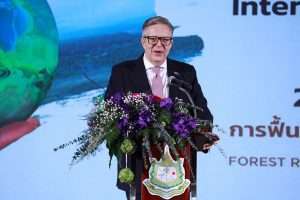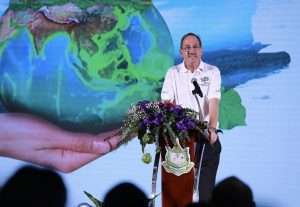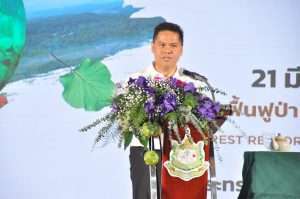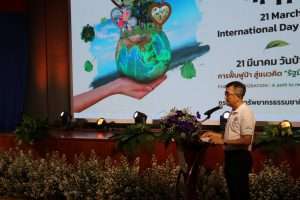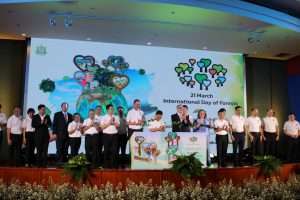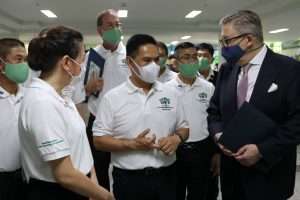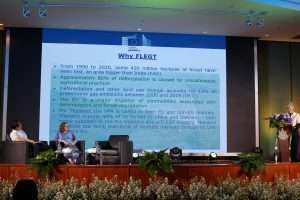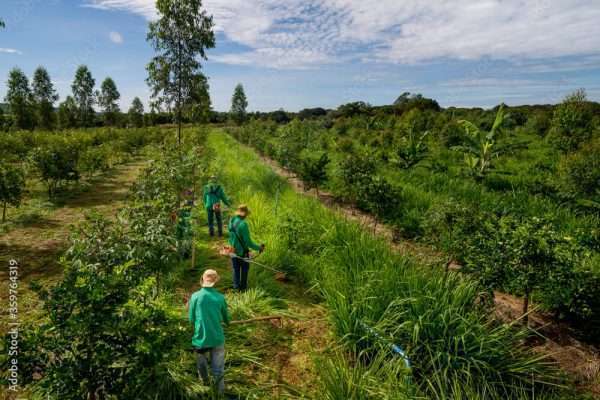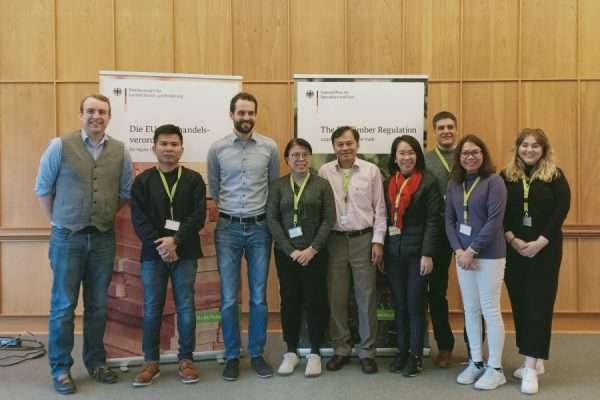On 18 March 2021, the Ministry of Natural Resources and Environment and the Royal Forest Department organized the International Day of Forests to highlight forests’ direct services on mitigating the effects of climate change, reversing the loss of biodiversity, and the economic benefits of the forest. This successful event saw participants from across sectors celebrate the national and international programmes working towards forest restoration and improving the country’s well-being through the forest.
To celebrate the cooperation between Thailand and the international community on forestry matters, H.E. Mr. Pirkka Tapiola, Ambassador of the European Union to Thailand, Mr. Thomas Hofer, Senior Forestry Officer, representative of the FAO, and H.E. Mr. Varawut Silpa-archa, the Minister of Natural Resources and Environment, attended the event to give opening remarks.
H.E. Mr. Pirkka Tapiola ‘the European Union has worked in partnership with the government, civil society and international community on forestry issues in Thailand.’ ‘Most importantly, the VPA negotiation, which has contributed to legal reform agenda by the Royal Thai government, demonstrating a willingness to address issues such as regulation of trees harvest on private land, community forestry law as well as foresting inclusion at the local level.’
Mr. Thomas Hofer remarked on the theme of this year’s International Day of Forests, emphasizing forest’s benefits on well-being and the role of forest in recovery amidst the COVID-19 pandemic. Furthermore, Mr. Hofer stressed the long-term partnership between FAO, European Union, and Thailand on the FAO-EU FLEGT Programme, which had seen 50 million Thai Baht committed to supporting 21 projects in Thailand on the multi-stakeholder engagement, the development of Thai timber legality assurance system, and Q.R. code system for timber tracking. The strong multi-stakeholder dialogue has enabled hundreds of stakeholders from all sectors to participate in the dialogue to improve forest governance.
Mr. Varawut Silpa-archa expressed the Ministry of Natural Resources and Environment’s commitments to turn Thailand into a carbon-neutral country. Mr. Silpa-archa assured that Thailand’s policies would focus on conserving forests to achieve the carbon-neutral goal and reap the indirect economic benefits of maintaining healthy forests, such as carbon stock selling.
In the last section of the meeting, representatives from Thailand, Australia, and the Delegation of the European Union to Thailand, led the panel discussion on Sustainable Trade and Cooperation.
Ms. Amber Parr, Counsellor-Agriculture, Australian Embassy, presented Australian anti-illegal logging regulation which requires all importers to Australia to exercise due diligence before importing timber to the Australian market, and the cooperation with Thailand to develop a country-specific guideline to assist Australian importers when exercising due diligence.
Ms. Jenni Lundmark, Programme Officer, the Delegation of the European Union to Thailand, presented the EU’s FLEGT Action Plan aiming to combat illegal logging from the sides of consumer country and producing country. As part of the FLEGT Action Plan, the European Union initiated the Voluntary Partnership Agreement negotiation with the timber-producing countries, including Thailand. Once Thailand signed the FLEGT VPA, the government will complete and start implementing the Thai Timber Legality Assurance System. The system will verify and license legal timber export from Thailand to all international markets, ensuring that timber export from Thailand complies with Thai regulation and can be traced to the harvesting site. FLEGT licensed timber products will be granted preferential access to the EU market providing economic benefits of legal compliance in the timber sector.
Mr. Sapol Boonsermsuk, Director of the Forestry Foreign Office, discussed the country’s forestry policy, which aims to increase forest area and support the legal timber trade and production aligning with the National Strategy on eco-friendly development and growth. Working towards the National Strategy’s goal, Thailand started a regulatory reform to ensure that the Thai timber supply chain is controlled and traceable from the sourcing point, transport point, processing point to the domestic market, or export point. Furthermore, the Royal Forest Department has been involved with countries and international organizations, and private companies to ensure that no illegal timber can enter the Thai supply chain.

